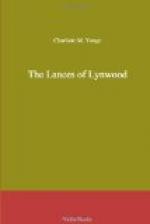“They will murder him,” exclaimed Eustace; and breaking from his new friends, he made his way to the gate, and hurried into the town, just as Fulk had fallen to the ground, struck by a heavy stone hurled by the hand of no other than John Ingram. He rushed forward amid the hail of stones, and, as he lifted Clarenham’s head, called out, “How is this! Brave men of Bordeaux, would you become murderers! Is this like honourable men, to triumph over the fallen!”
They held back in amazement for a second; then, as Eustace knelt by him and tried to recall his consciousness, murmurs arose, “Why interferes he with our affairs? He is English,” and they all held together. “Another of the purse-proud English, who pay no debts, and ruin the poor Bordelais.” “His blood we will have, if we cannot have his money. Away, Master Knight, be not so busy about the traitor, if you would not partake his fate.”
Eustace looked up as the stones were uplifted, and more than one Free Companion had drawn his sword. “Hold,” he exclaimed in a clear full-toned voice that filled every ear. “Hold! I am Eustace Lynwood, the Castellane of Chateau Norbelle!”
There was an instant silence. Every one pressed forward to see him, whose recent adventures had made him an object of much interest and curiosity, and the attention of the crowd was entirely diverted from the former unhappy subject of their pursuit. Whispers passed of “Noble Knight! flower of chivalry! how generous and Christian-like he bends over his enemy! Nay, if he revenge not himself, what right have we? And see, his arm is still in a scarf from the treachery of those villains! Well, I would yet give yon ruffian his desert.”
By this time Eustace having observed Ingram among the crowd, summoned him to his side, and at the same time courteously craving the aid of one of the by-standers (who, of course, though collectively lions, were individually lambs), succeeded in conveying Clarenham, whose senses had so far returned that he was able to rise with their assistance, to the door of a monastery chapel, the porch of which opened upon the street.
“Holy Fathers,” said Eustace, “I crave the protection of the Church for an unhappy, and, I trust, a penitent man, praying you will tend him well to aid and relief alike of body and soul, until you hear from me again.”




